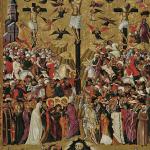Heresy is not so much a lie as an infected, inflamed, and cancerous truth. It takes one or two things out of the Tradition and then, like a metastasizing cancer attacking healthy tissue, attacks all the rest of the Catholic faith. Chesterton, writing nearly a century ago, describes the process:
Now, it was just here that, for me, the business began to be odd and interesting. For, looking back on older religious crises, I seem to see a certain coincidence, or rather, a set of things too coincident to be called a coincidence After all, when I come to think of it, all the other revolts against the Church, before the Revolution and especially since the Reformation, had told the same strange story. Every great heretic had always exhibit three remarkable characteristics in combination. First, he picked out some mystical idea from the Church’s bundle or balance of mystical ideas. Second, he used that one mystical idea against all the other mystical ideas. Third (and most singular), he seems generally to have had no notion that his own favourite mystical idea was a mystical idea, at least in the sense of a mysterious or dubious or dogmatic idea. With a queer uncanny innocence, he seems always to have taken this one thing for granted. He assumed it to be unassailable, even when he was using it to assail all sorts of similar things. The most popular and obvious example is the Bible. To an impartial pagan or sceptical observer, it must always seem the strangest story in the world; that men rushing in to wreck a temple, overturning the altar and driving out the priest, found there certain sacred volumes inscribed “Psalms” or “Gospels”; and (instead of throwing them on the fire with the rest) began to use them as infallible oracles rebuking all the other arrangements. If the sacred high altar was all wrong, why were the secondary sacred documents necessarily all right? If the priest had faked his Sacraments, why could he not have faked his Scriptures? Yet it was long before it even occurred to those who brandished this one piece of Church furniture to break up all the other Church furniture that anybody could be so profane as to examine this one fragment of furniture itself. People were quite surprised, and in some parts of the world are still surprised, that anybody should dare to do so.
Again, the Calvinists took the Catholic idea of the absolute knowledge and power of God; and treated it as a rocky irreducible truism so solid that anything could be built on it, however crushing or cruel. They were so confident in their logic, and its one first principle of predestination, that they tortured the intellect and imagination with dreadful deductions about God, that seemed to turn Him into a demon. But it never seems to have struck them that somebody might suddenly say that he did not believe in the demon. They were quite surprised when people called “infidels” here and there began to say it. They had assumed the Divine foreknowledge as so fixed, that it must, if necessary, fulfil itself by destroying the Divine mercy. They never thought anybody would deny the knowledge exactly as they denied the mercy. Then came Wesley and the reaction against Calvinism; and Evangelicals seized on the very Catholic idea that mankind has a sense of sin; and they wandered about offering everybody release from his mysterious burden of sin. It is a proverb, and almost a joke, that they address a stranger in the street and offer to relax his secret agony of sin. But it seldom seemed to strike them, until much later, that the man in the street might possibly answer that he did not want to be saved from sin, any more than from spotted fever or St. Vitus’s Dance; because these things were not in fact causing him any suffering at all. They, in their turn, were quite surprised when the result of Rousseau and the revolutionary optimism began to express itself in men claiming a purely human happiness and dignity; a contentment with the comradeship of their kind; ending with the happy yawp of Whitman that he would not “lie awake and weep for his sins.”
Now the plain truth is that Shelley and Whitman and the revolutionary optimists were themselves doing exactly the same thing all over again. They also, though less consciously because of the chaos of their times, had really taken out of the old Catholic tradition one particular transcendental idea; the idea that there is a spiritual dignity in man as man, and a universal duty to love men as men. And they acted in exactly the same extraordinary fashion as their prototypes, the Wesleyans and the Calvinists. They took it for granted that this spiritual idea was absolutely self-evident like the sun and moon; that nobody could ever destroy that, though in the name of it they destroyed everything else. They perpetually hammered away at their human divinity and human dignity, and inevitable love for all human beings; as if these things were naked natural facts. And now they are quite surprised when new and restless realists suddenly explode, and begin to say that a pork-butcher with red whiskers and a wart on his nose does not strike them as particularly divine or dignified, that they are not conscious of the smallest sincere impulse to love him, that they could not love him if they tried, or that they do not recognize any particular obligation to try.
It might appear that the process has come to an end, and that there is nothing more for the naked realist to shed. But it is not so; and the process can still go on. There are still traditional charities to which men cling. There are still traditional charities for them to fling away when they find they are only traditional. Everybody must have noticed in the most modern writers the survival of a rather painful sort of pity. They no longer honour all men, like St. Paul and the other mystical democrats. It would hardly be too much to say that they despise all men; often (to do them justice) including themselves. But they do in a manner pity all men, and particularly those that are pitiable; by this time they extend the feeling almost disproportionately to the other animals. This compassion for men is also tainted with its historical connection with Christian charity; and even in the case of animals, with the example of many Christian saints. There is nothing to show that a new revulsion from such sentimental religions will not free men even from the obligation of pitying the pain of the world. Not only Nietzsche, but many Neo-Pagans working on his lines, have suggested such hardness as a higher intellectual purity. And having read many modern poems about the Man of the Future, made of steel and illumined with nothing warmer than green fire, I have no difficulty in imagining a literature that should pride itself on a merciless and metallic detachment. Then, perhaps, it might be faintly conjectured that the last of the Christian virtues had died. But so long as they lived they were Christian.
(Any resemblance between this “merciless and metallic” vision and a pitiless religion of swastika-venerating cruels who somehow think themselves the Final Purification of Truly True Christianity is purely coincidental):
Because heresy is always based on a truth, it (like cancer) can evade the immune system for a long time even in its most demented forms. And the higher and better the truth is, the harder it is to root out the heresy, for the heretic can always point an accusing finger at the sane person and say, “You are an enemy of Truth and Goodness!” if the sane one dares to suggest the heretic’s One Sacred Truth must be taken with other truths.
This is why the archetypal heresy is Arianism. It took the absolute truest and best thing in all of eternity–God the Father himself–and weaponized him against the other two Persons of the Trinity. Heresy is a kind of madness, not in the sense of raving hallucination, but in Chesterton’s sense of a sort of barren hyper-rationalism about a single monomaniac idea:
Every one who has had the misfortune to talk with people in the heart or on the edge of mental disorder, knows that their most sinister quality is a horrible clarity of detail; a connecting of one thing with another in a map more elaborate than a maze. If you argue with a madman, it is extremely probable that you will get the worst of it; for in many ways his mind moves all the quicker for not being delayed by the things that go with good judgment. He is not hampered by a sense of humour or by charity, or by the dumb certainties of experience. He is the more logical for losing certain sane affections. Indeed, the common phrase for insanity is in this respect a misleading one. The madman is not the man who has lost his reason. The madman is the man who has lost everything except his reason.
The madman’s explanation of a thing is always complete, and often in a purely rational sense satisfactory. Or, to speak more strictly, the insane explanation, if not conclusive, is at least unanswerable; this may be observed specially in the two or three commonest kinds of madness. If a man says (for instance) that men have a conspiracy against him, you cannot dispute it except by saying that all the men deny that they are conspirators; which is exactly what conspirators would do. His explanation covers the facts as much as yours. Or if a man says that he is the rightful King of England, it is no complete answer to say that the existing authorities call him mad; for if he were King of England that might be the wisest thing for the existing authorities to do. Or if a man says that he is Jesus Christ, it is no answer to tell him that the world denies his divinity; for the world denied Christ’s.
Nevertheless he is wrong. But if we attempt to trace his error in exact terms, we shall not find it quite so easy as we had supposed. Perhaps the nearest we can get to expressing it is to say this: that his mind moves in a perfect but narrow circle. A small circle is quite as infinite as a large circle; but, though it is quite as infinite, it is not so large. In the same way the insane explanation is quite as complete as the sane one, but it is not so large. A bullet is quite as round as the world, but it is not the world. There is such a thing as a narrow universality; there is such a thing as a small and cramped eternity; you may see it in many modern religions. Now, speaking quite externally and empirically, we may say that the strongest and most unmistakable mark of madness is this combination between a logical completeness and a spiritual contraction. The lunatic’s theory explains a large number of things, but it does not explain them in a large way.
The animating monomaniac idea driving the MAGA/Bolsonaro Catholics is the sanctity of unborn human life. And it has led them to become the biggest enemies of the Church–and of human life–in the Church. Of which more tomorrow.













